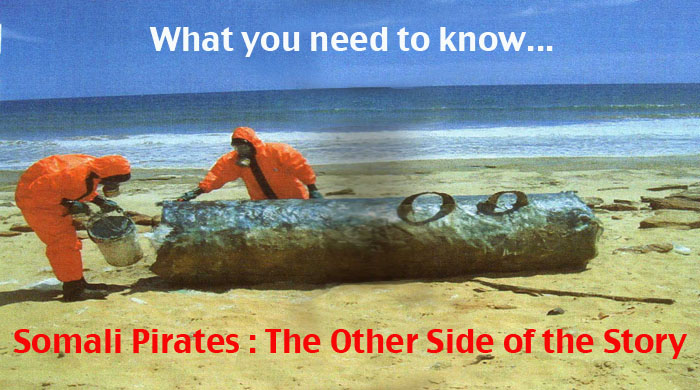
How do I tell you about this?
Most of you have already heard about the Somali pirates. Just recently they captured an American cargo ship and held the captain hostage. They have done this to many other vessels from a variety of different countries. In fact, the American captain was lucky -- he escaped, with the help of some sharp-shooter Navy Seals -- but hundreds of international sailors and crew are still being held by Somali pirates who seek millions of dollars for their safe return, and the safe return of their ships.
You know all this already, though. And you probably think it's just one more evil group of people trying to get rich quick. You probably even think we should just kill them all or find their Somali-based camp and wipe it out and be done with it.
But there's another side of this story you haven't been told. And when you hear it, you might just change your opinion of what's been going on.
I want to first describe Somalia. It's not a beautiful place, in fact it has been compared to hell on earth. All of Africa is poor by western standards, but Somalia is poor by African standards. Decades of drought, famine, genocide, war and corruption have left the inhabitants of this dusty ruin of a country in a constant battle for daily survival.
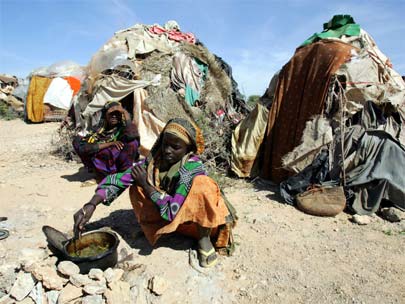 The
land is littered with trash and debris from brief periods of hope and
prosperity that cycled through corruption and violence. People live in
huts made of trash and a majority of the nation survives on their only
resource -- the ocean.
The
land is littered with trash and debris from brief periods of hope and
prosperity that cycled through corruption and violence. People live in
huts made of trash and a majority of the nation survives on their only
resource -- the ocean.In the latter part of the 1990s, Somali people began to get sick. It was isolated at first -- skin rashes, some hair falling out, bleeding of the gums, diarrhea... and it came and went. Some people thought it could have been the fish or the water, but no one really could focus on the cause. Then, on Christmas day of 2004, it all became clear.
The great earthquake in Indonesia caused a deadly tsunami that moved west, killing hundreds of thousands of people along the way, and finished by pushing the ocean waters up the Somali coast. After it receded, Somali people found dozens of huge, strange metal cylinders on their shoreline.
Being impoverished but resourceful, people began to open the cylinders and scavenge through the contents. Maybe there was something of value inside... something they could use or sell for food. Some cylinders contained what appeared to be rocks or dirt, others had what looked like plastic and glass trash. Soon, the beaches were littered with the same debris, likely from cylinders that had broken apart under the water.
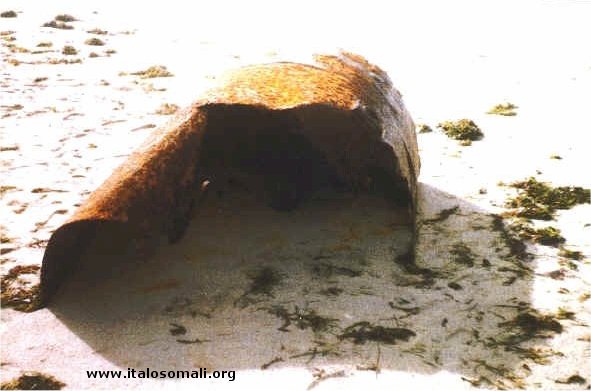
In a schoolyard, the bullies usually pick on the weakest kids. In the global schoolyard, a country without a government to protect its people, like Somalia, is an invitation for abuse. And when the abuse is about money it's a done deal.
The easiest way to abuse Somalia was to rob them of their one great resource -- food. According to Ahmedou Ould-Abdallah, the United Nations envoy to Somalia,
"European ships have been looting Somaia's seas of their greatest resource: seafood. We have destroyed out own fish stocks by over-exploitation ñ and now we have moved on to theirs. More than $300 million worth of tuna, shrimp, lobster and other sea life is being stolen every year by vast trawlers illegally sailing into SomaliaÃs unprotected seas."
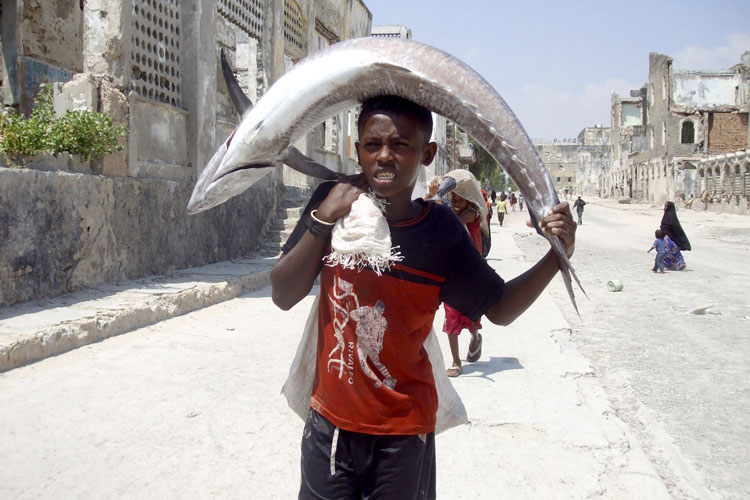
But that's not the worst of it.
In the latter part of the 20th Century, a growing expense to both private corporations and governments has been the disposal of waste -- biological from hospitals and labs, toxic waste from factories and industry and nuclear waste from medical and military use. Even the least expensive disposal of these toxic materials can cost $250 per ton.
But what if a company offered to dispose of these toxic wastes for just $2.50 per ton? You can see where this story is going.
In the mid-90s, a Swiss firm, Achair Partners, and an Italian company, Progresso, offered their quick toxic waste disposal services to a host of European nations. The waste was loaded on to their ships and sailed away. Oh yes, there was talk and plans were made for giant incinerators to neutralize the poisons. It was all supposed to be ecological. But none of the contractors -- mostly European nations -- bothered much to check that out. Yes, the waste was loaded on to their ships and sailed away... only to be dumped in the shallow ocean off Somalia.
After the 2005 tsunami, much of the once submerged waste found it way to the beaches where the broken containers spread debris and toxic particles inland. Nick Nuttall, a UN Environment Program spokesman, said that there are reports from villagers of a wide range of medical problems like mouth bleeds, abdominal hemorrhages, unusual skin disorders and breathing difficulties in many of the northern Somali villages like Hobbio and Benadir.
What? You never heard of this before?
Humans are an amazing species. We are capable of the best and worst. At best we can survive and struggle against almost anything to ensure our survival. The Somali people did. Faced with no government to protect them from the pollution of their ocean, and the depletion of their only source of food, they organized against the dumping. They organized locally in tribes, and the tribes organized clans. With no coast guard, the Somali fishermen tried to thwart off the huge ships that were dumping uranium, mercury, lead, medical waste and other toxins on their food supply and livelihood. They knew their small effort would have little effect on the huge dumping companies... but maybe if the world knew... maybe the world would stop them.
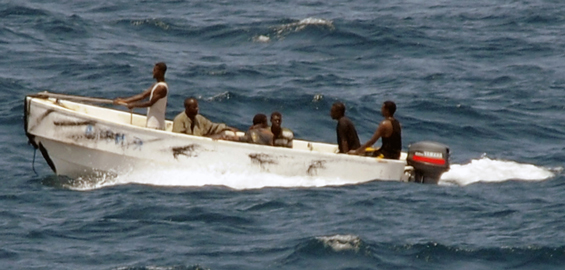
"We are reacting to the toxic waste that has been continually dumped on the shores of our country for nearly 20 years. The Somali coastline has been destroyed. We believe this money is nothing compared to the devastation that we have seen on the seas."
Ex-Somali Army Colonel Mohammed Nureh Abdulle lives in Haradhere ñ the
town in the center of the pirate community. In a BBC interview he said,
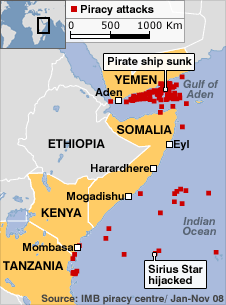 "The town's residents are more concerned with the dumping of toxic waste than piracy... this dumping has been going on for a very long time. In 1991 the government collapsed in this African Nation and certain large corporations took advantage of this. European ships started appearing off the coast of Somalia, dumping thousands of barrels of toxic waste into the ocean. The coastal population began to get sick. At first they suffered strange rashes, nausea and malformed babies and many other symptoms but lacking proper medical attention much was overlooked. Then after the 2005 tsunami, hundreds of the dumped and leaking barrels washed on shore. People began to suffer from radiation sickness and more than 300 died. A few nights ago, some tanks came out from the high sea and they cracked it seems and now they are leaking into the water and into the air. |
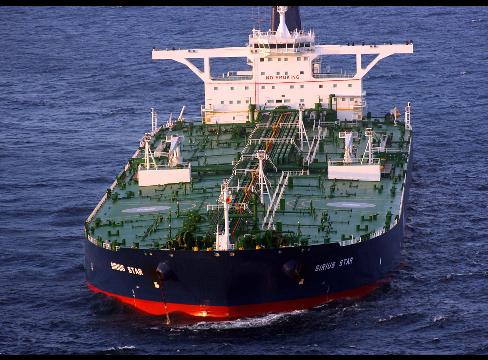 In
August of 2008, a group of about 40 Somalis attacked and seized an
Iranian cargo ship, the Dyanat and took it to the port of Eyl. There it
was secured by a larger group of about 100 Somalis. Within days of
securing the ship, those Somalis that had been on board and inspected
the cargo began to develop strange health problems. They had strange
skin burns, loss of hair, nausea... and a number of men died. The actual
cargo containers were securely locked and the crew claimed they did not
have the access codes to open them. At first the captain said the
containers contained "crude oil" but later admitted they were carrying
"minerals." After a week the ransom was paid and the ship continued.
Many believe it contained radioactive waste that would have been dumped
had the SomaliÃs not intervened.
In
August of 2008, a group of about 40 Somalis attacked and seized an
Iranian cargo ship, the Dyanat and took it to the port of Eyl. There it
was secured by a larger group of about 100 Somalis. Within days of
securing the ship, those Somalis that had been on board and inspected
the cargo began to develop strange health problems. They had strange
skin burns, loss of hair, nausea... and a number of men died. The actual
cargo containers were securely locked and the crew claimed they did not
have the access codes to open them. At first the captain said the
containers contained "crude oil" but later admitted they were carrying
"minerals." After a week the ransom was paid and the ship continued.
Many believe it contained radioactive waste that would have been dumped
had the SomaliÃs not intervened.But humans are also capable of the worst. Despite the Italian Greenpeace announcement in 1992 that this activity was going on, despite the United Nations warning in that same year, despite the Italian parliament's recognition of these activities in 2000, the thousands of Somali people who are sick, the mutations and hundreds of deaths and contaminated fish, even today, these facts are suppressed.
The European nations who signed contracts with Achair and Progresso could care less about a poor country with dark skinned people. In the color spectrum of greed, green trumps every color. It is much easier to ferment hatred for brown or black skinned "pirates" than to admit the real reason for these desperate acts. It is much easier to just "kill them all" than to step in to their shoes (or lack of shoes) and see what options you might choose.
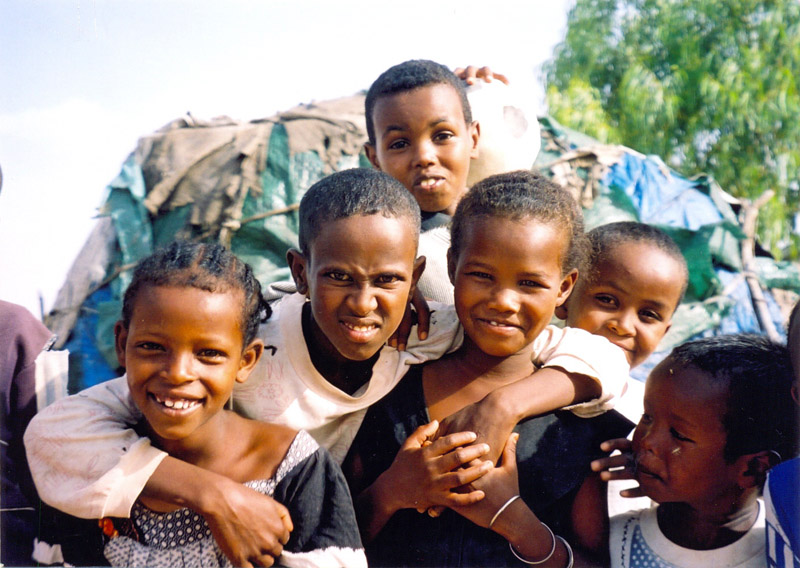
Oh, there's much more I could write about this. I could tell you the guilty individuals who allowed this to happen or how the Somali warlords received arms in return for their complicity. Or the brave journalists like Ilaria Alpi and Mivan Brovato, who were assassinated in Somalia following their interview with a high level whistle-blower... But, for now, open your eyes and look for the truth behind the headlines and sound-bites.
It's much more interesting to think in black and white, good and bad. But too often the truth comes in only one color, the green of money.